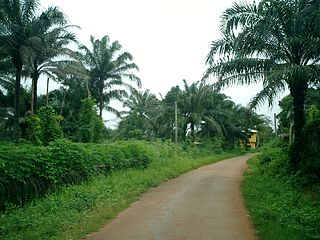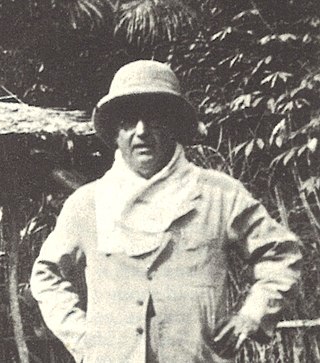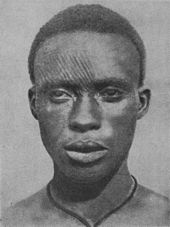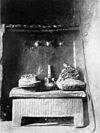
Odinani or Odinala, also known as Omenala, Omenana, Odinana, Ọmenani, Ọdịlalị, or Ọdịlala, are the traditional cultural beliefs and practices of the Igbo people of south east Nigeria. These terms, as used here in the Igbo language, are synonymous with the traditional Igbo "religious system" which was not considered separate from the social norms of ancient or traditional Igbo societies. Theocratic in nature, spirituality played a huge role in their everyday lives. Although it has largely been supplanted by Christianity, the indigenous belief system remains in strong effect among the rural and village populations of the Igbo, where it has at times influenced the colonial religions. Odinani is a pantheistic and polytheistic faith, having a strong central deity at its head. All things spring from this deity. Although a pantheon of other gods and spirits, these being Ala, Amadiọha, Anyanwụ, Ekwensu, Ikenga, exists in the belief system, as it does in many other Traditional African religions, the lesser deities prevalent in Odinani serve as helpers or elements of Chukwu, the central deity.

The Igbo people are an ethnic group in Nigeria. They are primarily found in Abia, Anambra, Ebonyi, Enugu, and Imo States. A sizable Igbo population is also found in Delta and Rivers States. Ethnic Igbo populations are found in Cameroon, Gabon, and Equatorial Guinea, as migrants as well as outside Africa. There has been much speculation about the origins of the Igbo people, which are largely unknown. Geographically, the Igbo homeland is divided into two unequal sections by the Niger River—an eastern and a western section. The Igbo people are one of the largest ethnic groups in Africa.

Eze is an Igbo word which means King. Such words as Igwe and Obi, plus others, are used by Igbo people as titles of respect and homage to the Eze. Igwe is derived from the Igbo word Igwekala or Eluigwekala, "the sky or heaven above the sky is higher or bigger than land", implying that the Eze is a higher servant of the people. Obi usually refers to the centre building for receiving visitors within an Igbo leader's or man's homestead. When used as a title of respect for the Eze, Obi implies: "the one who sits in the throne house or heart of the Kingdom."
The Frafra are a subset of the Gurunsi peoples living in Upper East Region. The adopted name 'Frafra' is a corruption from colonial times of the salutation "Yɛ fara fara?" when translated means "How is your suffering [work]?". It may carry pejorative overtones in local usage. Frafra-language speakers number approximately 300,000. The larger group of Gurunsi people inhabit southern Burkina Faso and Upper East of Ghana.

Awka is the capital city of Anambra State, Nigeria. The city was declared capital on 21 August 1991, after the creation of Anambra and Enugu state, which moved the capital from Enugu to Awka. The city has an estimated population of 301,657 as of the 2006 Nigerian census, and over 2.5 million as of a 2018 estimate. The city is located at 199.1 kilometres (123.7 mi), by road, directly north of Port Harcourt in the centre of the densely-populated Igbo heartland in South-East Nigeria.

Igboland, also known as Southeastern Nigeria, is the indigenous homeland of the Igbo people. It is a cultural and common linguistic region in southern Nigeria. Geographically, it is divided into two sections by the lower Niger River: an eastern and a western one. Its population is characterised by the diverse Igbo culture and the speakers of equally diverse Igbo languages.

Igbo-Ukwu is a town in the Nigerian state of Anambra in the south-central part of the country. The town comprises three quarters namely Obiuno, Ngo, and Ihite with several villages within each quarter and thirty-six (36) administrative wards.It is also bordered by Ora-eri, Ichida, Azigbo, Ezinifite, Amichi, Isuofia, Ikenga and some other towns.
Nri is an Igbo city-state in Anambra State, Nigeria. It was the seat of a powerful and imperial state who was influenced much by the territories inhabited by the Igbo of Awka and Onitsha to the east; the Efik, the Ibibio, to the south; Nsukka and Asaba, and the Anioma to the west. Today, Nri claims to be the heart and origin of the Igbos, but it is historically dated that Igbo Ukwu, formally known as Igbo, and Igbo Nkwo is the true origin and beginning of the Igbos.

The Kingdom of Nri was a medieval polity located in what is now Nigeria. The kingdom existed as a sphere of religious and political influence over a significant part of what is known today as Igboland prior to expansion, and was administered by a priest-king called an Eze Nri. The Eze Nri managed trade and diplomacy on behalf of the Nri people, a subgroup of the Igbo-speaking people, and possessed divine authority in religious matters.
Ikenga is a horned Alusi found among the Igbo people in southeastern Nigeria. It is one of the most powerful symbols of the Igbo people and the most common cultural artifact. Ikenga is mostly maintained, kept or owned by men and occasionally by women of high reputation and integrity in the society. It comprises someone's Chi, his Ndichie (ancestors), aka Ikenga, ike (power) as well as spiritual activation through prayer and sacrifice.
Igbo culture are the customs, practices and traditions of the Igbo people of southeastern Nigeria. It consists of ancient practices as well as new concepts added into the Igbo culture either by cultural evolution or by outside influence. These customs and traditions include the Igbo people's visual art, music and dance forms, as well as their attire, cuisine and language dialects. Because of their various subgroups, the variety of their culture is heightened further.
The Igbo calendar is the traditional calendar system of the Igbo people from present-day Nigeria. The calendar has 13 months in a year (afo), 7 weeks in a month (onwa), and 4 days of Igbo market days in a week (izu) plus an extra day at the end of the year, in the last month. The name of these months was reported by Onwuejeogwu (1981).

The Nze na Ozo society, otherwise known as the Agbalanze society, is the highest and most important spiritual, religious and social grouping in the Igbo society of Southeast Nigeria.

Awka-Etiti, historically known as Awka-Diedo ; later mentioned as Awka-Nkakwu (Okankaku) by colonial authors, is an affluent town comprising seven villages in Idemili South local government area of Anambra state, Nigeria. The seven villages of Awka-Etiti in order of age established are: Nkolofia, Umunocha, Ejighinandu, Iruowelle, Umudunu, Nnaba and Ogunzele.
The Waawa clan of Northern Igboland, also referred to as Ndi Waawa, Wawa People, are a unique sub-group of the Igbo people in Enugu and Ebonyi State, Nigeria, consisting of several communities, who all speak a unique dialect of Igbo called Waawa. The most notable among these are the Agbaja and Ngwo which consist of peoples between the wooded lands of Awka to the rocky valleys of Enugu. The Agbaja are made up of communities in present-day Ngwo clan, Udi, Ezeagu, Umulokpa, Igbo-Etiti, Oji River, greater Awgu, Odume, Ndiagbor, Nenwe, Mpu, Okpanku and Enugu East Local Government Areas. Other notable parts of the Waawa clan include Nkanu, Nsukka, Abia, Nike, Agbani, Owo, and other communities in Enugu State. The Waawa are most notably associated with Chief Onyeama's people from Eke, who was the paramount ruler of Agbaja in the early 20th century.

George Thomas Basden was Archdeacon of the Niger from 1926 until 1936.
The South East is the one of the six geopolitical zones of Nigeria representing both a geographic and political region of the country's inland southeast. It comprises five states – Abia, Anambra, Ebonyi, Enugu, and Imo.

Scarification in Africa is a major aspect of African cultures and cultural practice among African ethnic groups; the practice of scarification in Africa includes the process of making "superficial incisions on the skin using stones, glass, knives, or other tools to create meaningful pictures, words, or designs" and expresses "clan identity, status within a community, passage into adulthood, or spiritual significance."











